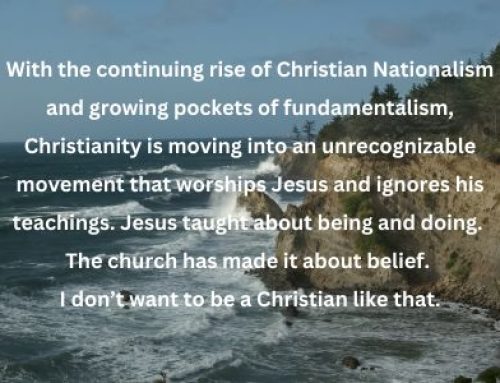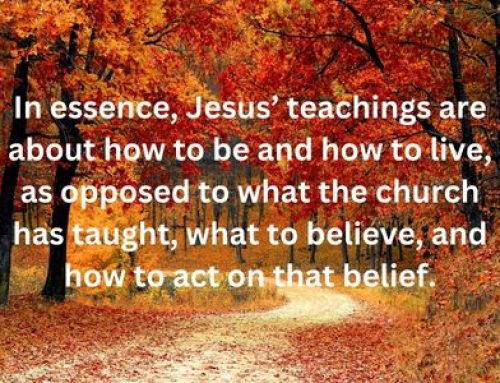A Lenten Meditation Based on Genesis 2:9, 3:1-13, Matthew 5:21-48
Genesis 2:9, “And out of the ground the Lord God made to grow every tree that is pleasant to the sight and good for food; the Tree of Life, also in the midst of the garden, and the tree of knowledge of good and evil.” (The Aramaic Bible, Peshitta text)

So God has planted all these many trees for food and in the middle of the orchard (garden) he placed two special trees, the Tree of Life and the tree of knowledge of good and evil. Adam and Eve could eat off any tree that they wanted except for the tree of knowledge of good and evil. It was off limits. The Tree of Life was fair game, they could eat all they wanted from the Tree of Life. We don’t have a lot of information in the Bible regarding the Tree of Life although it holds special significance to Judaism and is revered in the Kabala, writings of Jewish mysticism. It is mentioned in other Bible texts as well, as Wikipedia points out, In the Bible outside of Genesis, the term “tree of life” appears in Proverbs (3:18; 11:30; 13:12; 15:4) and Revelation (2:7; 22:2,14,19). It also appears in 2 Esdras (2:12; 8:52) and 4 Maccabees (18:16), which are included among the Jewish apocrypha.” (Wikipedia, The Tree of Life (Biblical)
It is not my intention to explore each of these texts other than to point out that they exist. This meditation is more concerned with the tree of knowledge of good and evil.
We find Adam and Eve in the garden (Genesis chapter 3) when they are confronted by a talking serpent. It might be assumed that the serpent is resting in the tree of knowledge of good and evil. There doesn’t seem to be any fear expressed by either Adam or Eve that they are confronted by a talking serpent. Of course, that is the beauty of metaphor, nothing is impossible.
Perhaps the conversation went something like this:
Serpent: “So, has God given you any instructions regarding the food on any of these trees?”
Eve: “God said that we could eat from any of the trees except for the tree of knowledge of good and evil, even if we should touch it we will surely die.” (Whatever that means!)
Serpent: (with a big smile on his face): “Oh my, such drama! Too bad God didn’t tell you the truth, because you won’t die, though it is a nice scare tactic. God did not want you to eat from it because it would open your eyes to the truth that you would be like the “gods” (yes, plural) knowing good from evil.”
Eve: (Being very intrigued, without any concern about what good or evil is) “It certainly looks delicious and pleasing to the eyes!” (She takes a bite) “Here Adam, you gotta try this, it’s heavenly!”
Adam: (Takes a bite and their eyes were opened with an immediate blush because they suddenly saw that they were naked.)
You know the rest of the story. God comes for a stroll in the garden looking for Adam and Eve. They had hidden because they didn’t want God to see that they were naked. (Apparently at this stage, God has yet to be omniscient).
God: “How did you know that you were naked? Did you eat from the tree I specifically told you not to?”
Adam: (Pointing to the woman) “This woman you gave me made me do it. It is her fault.”
Eve: “Now wait just a minute. I was tricked by the serpent. He made me an offer that I could not refuse. Besides, if you didn’t want us to eat from the tree, why did you put it there?” (Not actually said, but certainly implied.)
And thus, begins the history of man and his relationship to God.
Let’s unpack this metaphorical story. I find it interesting that God decides to put two trees in the center of the Garden. One of course, the Tree of Life which when eating the fruit gives soul satisfaction of oneness with God. The fruit of the tree makes you want to be in love forever with God. What else would one need besides a Tree of Life that offers unconditional connection with God. Yet, God puts another tree right beside the tree of Life. It is beautiful to behold with luscious looking fruit. However, there is something in the name that makes it a little foreboding…okay, a lot foreboding… the tree of knowledge of good and evil.
We don’t know if God defined his terms or not, or whether the garden couple really understood the meaning of Tree of Life and tree of knowledge of good and evil. That’s really not pertinent to the story. They only knew that they were not supposed to eat of the tree of knowledge. The text doesn’t give us any notion that the couple had a conversation with God about what good and evil might be. God just hangs it out there. Of course, we know why. Free will was built into the human being in order that his/her life might be self-directed and always connected to God by the individual’s personal choice.
New Testament scholar John Dominic Crossan refers to the tree of knowledge of good and evil as the tree of conscience. I like that, it really resonates with me. It is our conscience that helps direct our decisions and based on the information we have we live or die with our decision.
Adam and Eve could have had a very contented life just living and eating from the Tree of Life. The tree of knowledge was put there as a temptation to give Adam and Eve’s conscience an opportunity to make a choice. It was God’s test to see if man could endure his sacred connection or chose to be on his own. The tree of knowledge was extremely beautiful and had fruit that dared you to eat it. It was no coincidence that the serpent (usually considered to be Satan though there is no evidence to support that fact) was there as a used car salesman to promote the beauty and worth of the tree of knowledge.
Now I don’t think for a minute that women are more easily swayed than men. It purely depends on the topic or product. You give most men a whiff of a new pickup smell and he’s yours for the evening, or until the smell dissipates. But in this case Eve was first to take the bait. Obviously, Adam just stood there waiting to be directed. Sure enough, Eve was taken by the sales pitch of the serpent and indulged the fruit, then insisting that Adam try it because it was really something to die for! Sure enough, as the serpent had predicted, the fruit was very tasty. But also, all of sudden they realized that they were naked, and hurried about making some coverings for their naked bodies.
God confronts them and throws them out of the garden because they chose their own path by eating the fruit of knowledge.
This metaphorical story is really not about sin or punishment. But as Dr. Diana Butler Bass says, “…it is better understood as a story of choices and consequences. Adam and Eve are offered a choice to remain in their state of innocence, or to choose instead to have knowledge of good and evil — a knowledge that at this point in creation belongs only to God. It is a theological story explaining the origin of moral choice, the attribute of human conscience.” (from the Cottage, Diana Butler Bass, a Lenten sermon for Wednesday February 14th.)
Let’s now take a leap into the New Testament and the teachings of Jesus. Jesus was often teaching about conscience and choosing the right path. Wonder where he got that idea?
You have head it said: (from Matthew 5:21-48)
…You should not murder, but I tell you, make the choice to not even get angry with your brother or sister, because your anger will be subject to judgment.
…Do not commit adultery, but I tell you make the choice to not even look at another person lustfully because in doing so you have already committed adultery.
…Do not break your oath, but I tell you to make the choice to not swear an oath at all. A simple yes or no will suffice.
…An eye for an eye, a tooth for a tooth, but I tell you to make the choice of not resisting an evil person. If someone slaps you on the right cheek, turn to them the other cheek. If someone takes your shirt, give them also your coat as well.
…Love your neighbor and hate your enemy, but I tell you to make the choice to love your enemies and pray for those who trash your name.
Just a few examples from the Matthew text regarding Jesus’ teachings. As you can see, they are about making good choices to always serve the greater good. Diana Butler Bass says it this way: “Jesus came to reverse the damaging choices humanity has made because of the Tree of Conscience. Jesus had chosen rightly at his own time of temptation. He proclaimed the possibility of choosing rightly! We, too, could follow a way that would lead to life. And thus, Jesus re-issued the divine invitation: Choose the way of good, choose the way of love. Deliver us from temptation. Use your conscience to choose well.” (The Cottage, Lenten sermon Wednesday 2/14/2024)
There you have it, the simple story of the Bible narrative on our reckoning with the Tree of Conscience. May your conscience bring forth good works!




